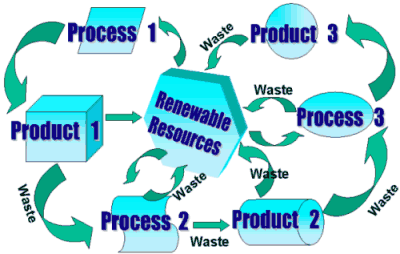| Background |
|
Economics is a vast subject area and it is not surprising to find that some fairly complicated economic arguments surround the issue of the "green economy". In simple terms the current linear concept of the economy is shown in figure 1a below, where labour and technology are combined with natural resources to produce both finished goods and waste. Figure 1b indicates the essential elements of a "green economy" i.e. there is no waste in nature, a green economy mimics nature by seeking to reduce wasteful production and to direct all waste back into the production cycle. Renewable resources are consumed only at the rate at which they can be replaced. This serves to illustrate the fundamental requirement of the "green economy" specifically that it functions on the principle of sustainable development. In essence the "green economy" is the result of the implementation of sustainable development at all levels. It is clear from this definition and figure 1b that a truly "green economy" does not yet therefore exist in reality and many analysts would argue that in any case 100% re-cycling is physically impossible and economically undesirable. |
| Figure 1a. The linear economy |
 |
| Figure 1b. The "green economy" |
 |
|
However in 1992 at the Rio Earth Summit 184 countries pronounced their commitment to sustainable development, i.e. "to meet the needs of the present without compromising the ability of future generations to meet their own needs". Thus globally countries are now in the process of developing the "green economy" i.e. an economy developing within a framework of environmental and social conditions, an economy of reuse and recycling.
In the much-publicised Brundtland report produced in 1987 by the World Commission on Environment and Development the commission stated that, "Sustainable development is not a fixed state of harmony, but rather a process of change in which the exploitation of resources, the direction of investments, the orientation of technological development, and institutional change are made consistent with future as well as present needs." |

In addition the report called for "a fivefold to tenfold in gross world economic output to meet the development needs of the poor and to provide the wealth and technological advances required to address ecological problems". These concepts may be surprising to many people who see sustainable development in the guise of a Green Charter that concentrates solely on global environmental issues but in fact economic development is desirable if social goals are to be met. |
Fundamental to the ethos of sustainable development is;
The question of how we define economic development and what framework it takes place within are more difficult issues to address. The challenge is to move the international commitment to sustainability from vision to action and this is where some of the difficulties and economic arguments have arisen. Since the aim of sustainable development is to achieve balance not only between social, environmental and economic issues, but to manage this feat between countries whose political, cultural and economic positions may be radically different, (in particular the global North - South divide of the "developed" and developing countries). This is hardly surprising. |
| Task 2. Devise a set of objectives/goals that would fulfil your own vision of the requirements to achieve sustainable global development. You may wish to refer to the essential elements of Agenda 21 to complete this. |